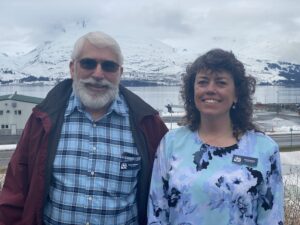
By Board President Robert Archibald and Executive Director Donna Schantz
Nothing can change the damage that resulted from the 1989 Exxon Valdez oil spill. Since our creation, the Council’s goal has always been to try to ensure it never happens again, at the same time making sure we are prepared with a strong response system in case prevention measures fail. We know that the more you tackle challenging issues and prepare ahead of time, the greater the likelihood of reducing the potential damage.
Our volunteers and staff put in countless hours fulfilling our mandates outlined in the Oil Pollution Act of 1990 and our contract with Alyeska Pipeline Service Company.
While much work continues to be done, we are still seeing concerning trends in the loss of experienced personnel, high attrition rates, and budget and staffing cuts in industry and the associated regulatory agencies. The Council has been raising concerns about the diminishment of agency oversight at the Valdez Marine Terminal for over a decade. We hope that a review of the adequacy of the present regulatory oversight of terminal operations, currently being conducted by the federal Government Accountability Office, will highlight any deficiencies that need to be addressed. And, while we are encouraged by Alyeska’s response to our 2023 report “Assessment of Risks and Safety Culture at Alyeska’s Valdez Marine Terminal,” we diligently continue to try to move all its recommendations forward.
We know that a strong regulatory structure benefits development in our state. It also is the cornerstone of protection for our people, communities, economies, and environment. After years of regulatory diminishment, we now need to see the actions necessary to not only stop the cutbacks, but also then restore these agencies to the levels put in place based on lessons learned from the 1989 oil spill.
While the Council is always ready to listen to what industry and regulators are willing to share with us, we will also continue to closely watch what they do. And that is what we are here to do: we listen, we watch, and we advise. We sometimes say that “Trust, but verify” is our unofficial motto. We want to trust that the problems we are speaking out about will be addressed, but will not stop our inquiries and our work until we can verify that they have been.
We know that industry and regulatory agencies have the same goal in mind as the Council: the safe transportation of oil through our region. Our role in that shared goal is defined by and dependent on citizen engagement. We must watch what is happening – the decisions being made, risks being assessed, safety measures implemented – and never be afraid to speak up. Those with the most to lose from oil pollution must have a voice in the decisions that can put their livelihoods and communities at risk. We will continue to work hard to be that voice.